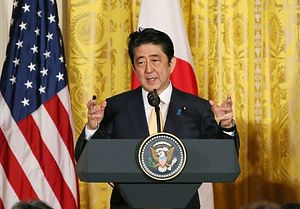North Korean leader Kim Jong-un’s surprise two-day visit to Beijing resets the negotiating table for the future of the Korean Peninsula. Kim’s meeting with Chinese leader Xi Jinping prior to other heads of state signaled that China will play a significant role in talks to denuclearize and bring a durable peace to the peninsula. To date, Kim has also lined up meetings with South Korean President Moon Jae-in on April 27 and U.S. President Donald Trump in May. Talks between Russian President Vladimir Putin and Trump appear to be in the works.
The only party conspicuously left out of these talks is Japan. Tokyo needs to send an unmistakable message to the United States that Japanese interests must also be represented in any bargaining with North Korea.
Tokyo has struggled to keep pace with the growing developments regarding North Korea over the past few months. The Japanese government only learned Trump would meet Kim after the president had already agreed to the invitation. While Tokyo is trying to establish its presence at these talks, it keeps getting pushed aside.
Trump’s agreement to meet Kim in May prompted Japanese Prime Minister Shinzo Abe to immediately organize a visit to the United States from April 17-18 at Mar-a-Lago, to discuss developments with and strategy about North Korea. Abe has stated that he is willing to join a trilateral meeting with Trump and Kim and he has already told Moon that Tokyo is ready for direct talks with Kim. Abe’s sudden eagerness to talk shows Tokyo is nervous about being marginalized throughout the series of spring summits. Most notably, Abe is anxious that the U.S.-North Korea talks will focus only on intercontinental-range ballistic missiles (ICBMs), ignoring the medium-range and short-range missiles that threaten Japan. In addition, Abe cannot afford to ignore the sensitive domestic issue within Japan of compelling Pyongyang to account for the 17 past abductions of Japanese citizens by the North Korean regime.
Abe’s second meeting with Trump at Mar-a-Lago estate will be a crucial moment to ensure that Abe can secure Japan’s priorities during the U.S.-North Korea summit. Despite a close personal rapport between Abe and Trump, the United States not only walked away from the Trans-Pacific Partnership deal when Trump came to power, but it also recently left Japan off a list of allies (which included South Korea) that would receive exemptions from the Trump administration’s tariffs on steel and aluminum. Trump’s slights prove that it’s not enough for Abe to just meet with the president—Abe needs to spread Japanese interests across the administration during his visit, including meetings with the secretary of state, the national security advisor, and the vice president.
Moreover, Abe is losing popular support in Japan over a cronyism scandal, which damages his hopes of securing a third term as prime minister. Abe needs a show of strength not only abroad, but also at home, and his April meeting may be the only time to take action.
In addition, Japan needs to work closely with South Korea to secure common interests. South Korea, too, has a vested interest in disarming North Korea’s short- and medium-range missiles, but unresolved historical tensions continue to keep the two nations at a distance and isolate Tokyo from the negotiation tables. More than ever, Japan needs to work to resolve these issues with South Korea to ensure its interests can capitalize on current momentum.
Likewise, the United States and South Korea benefit greatly from including Japan. First, allied unity is the surest counterweight to having China exercise undue influence on crucial security issues affecting the future of the peninsula. Second, should talks prove no more effective than previous attempts at reducing North Korea’s nuclear-armed missile programs, then it is the combination of the Japanese, South Korean, and U.S. militaries on the front lines of maintaining deterrence and defense, including layered missile defenses. Third, North Korean diplomacy provides an opportunity for all three countries to cooperate even when confronted with potentially thorny trade and economic disputes in a more protectionist world.
If Japan wants to ensure the safety of its citizens and maintain its status in Northeast Asia as a regional power, it needs to reach out to its allies now before its interests are relegated.
Melodie Ha is a researcher with the Asia Pacific Security Program at the Center for a New American Security (CNAS).

































